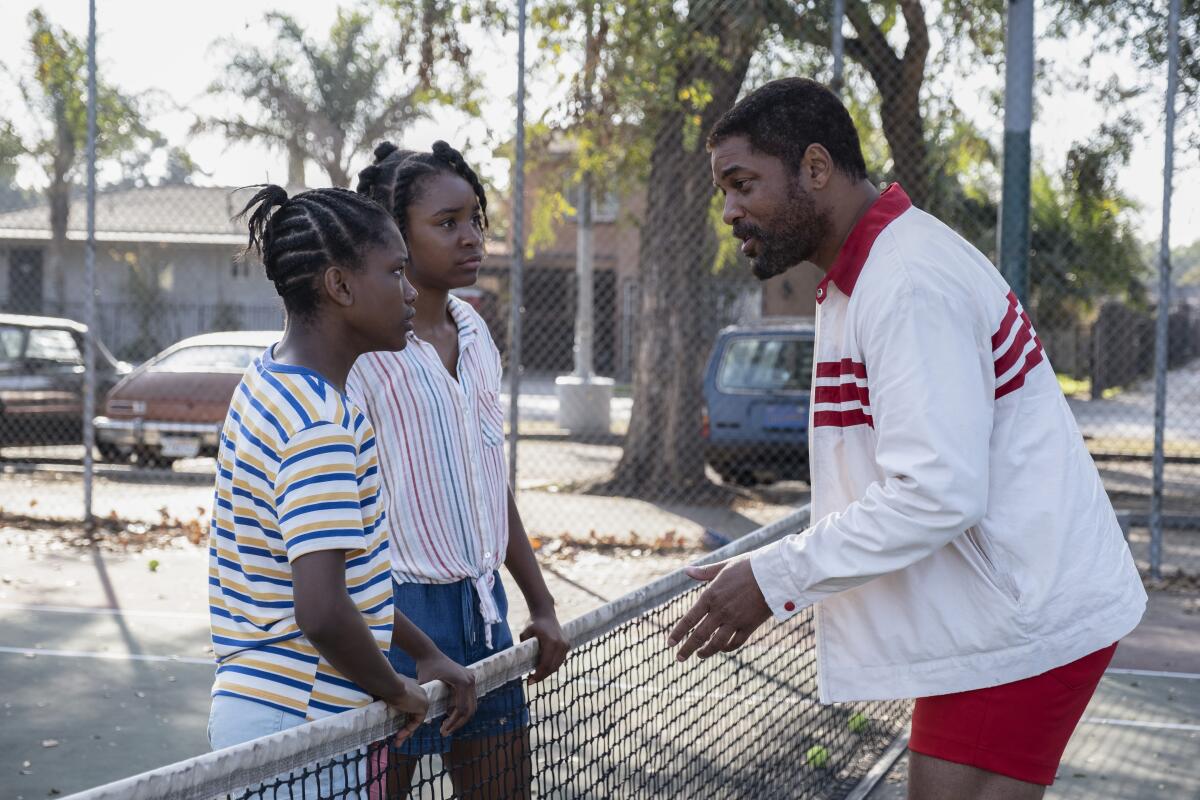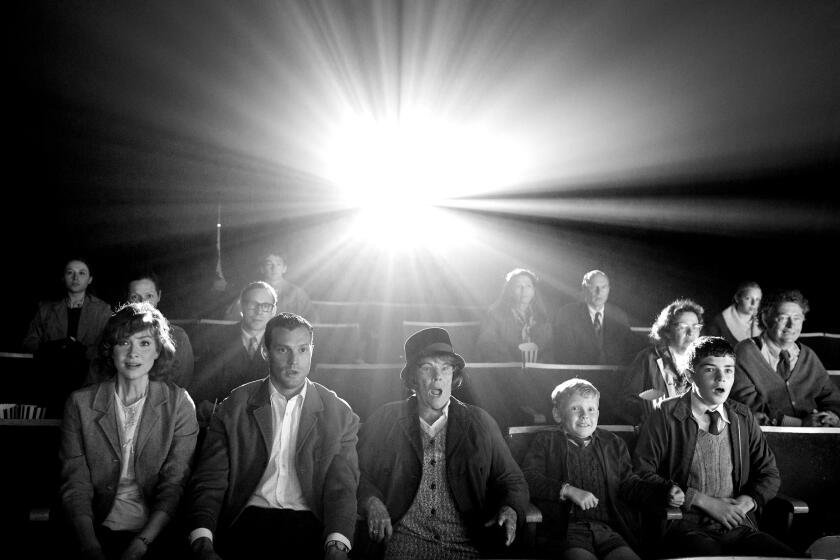The best picture winner needs a screenplay nomination. Which movie might be in trouble?

- Share via
Movies can win the Oscar for best picture without earning a screenplay nomination. But it doesn’t happen often — just seven times in the 93-year history of the Academy Awards and only twice in the last six decades.
Want the list? Best picture winners without a screenplay nomination, ranked:
7. “The Broadway Melody” (1929) Let’s be honest. You’ve probably only seen this cheesy movie — the first true Hollywood musical! — if you’re an Oscars obsessive who wants to impress (alarm?) people by telling them you’ve seen every best picture winner. (Full disclosure: I’m one of these people.) There are countless musicals from this era that I’d recommend before enduring this one.
6. “Cavalcade” (1933) Reportedly Hitler’s favorite film, which should provide some context to my ranking of “The Broadway Melody” above. It’s one spot worse than the movie Hitler loved.
“House of Gucci,” “King Richard” and “Don’t Look Up” are among this year’s star-laden Oscar contenders.
5. “Wings” (1927) The first best picture winner and the only silent movie to win the award. (The silent era salute “The Artist” could also count, I suppose, save for a couple of uses of sound.) The aviation stunt scenes hold up, so it’s better than just a curiosity.
4. “Grand Hotel” (1932) It’s the movie in which Garbo says, “I want to be alone.” And it boasts an all-star cast that includes Joan Crawford, John and Lionel Barrymore, Wallace Beery and Jean Hersholt. If you’re interested in what A-list talent looked like in Hollywood’s Golden Era, this is the place to start.
3. “The Sound of Music” (1965) Pauline Kael called this movie the “sugar-coated lie people seem to want to eat.” Yes! It’s delicious, like crisp apple strudel! And it seems to have undergone a reappraisal in recent decades, led by critics who don’t hate life and all the nice things it offers.
2. “Hamlet” (1948) Laurence Olivier is Hamlet.
1. “Titanic” (1997) James Cameron’s blockbuster so dominated the box office and popular culture that, amid the millionth replaying of Celine Dion’s “My Heart Will Go On,” haters had to find something to grouse about. My old friend Times film critic Kenny Turan spoke for a number of people when he called Cameron’s screenplay a “hackneyed, completely derivative copy of old Hollywood romances, a movie that reeks of phoniness and lacks even minimal originality.” Kenny did not like this movie. Admittedly, the film’s dialogue can be corny, but the screenplay’s construction itself is airtight.
So ... four movies from the Oscars’ infancy, a Shakespeare adaptation and “Titanic” and “The Sound of Music,” juggernauts that were impossible to ignore, even if you were so inclined. It’s clear then that aspiring best picture contenders should at least have the appearance of literacy and the approval of the academy’s writers branch voters. If not? Well, to quote Tommy, our favorite third-class passenger from the ever-quotable “Titanic”: “Forget it, boyo.”
Which screenplays will help this year’s challengers rise and not sink to the bottom? Let’s take a look.
ADAPTED SCREENPLAY
“The Power of the Dog,” Jane Campion
“The Lost Daughter,” Maggie Gyllenhaal
“CODA,” Siân Heder
“Drive My Car,” Ryûsuke Hamaguchi, Takamasa Oe
“West Side Story,” Tony Kushner
On the cusp: “Dune,” Jon Spaihts, Denis Villeneuve, Eric Roth; “The Tragedy of Macbeth,” Joel Coen; “Nightmare Alley,” Guillermo del Toro, Kim Morgan; “Passing,” Rebecca Hall; “Cyrano,” Erica Schmidt; “The Humans,” Stephen Karam; “Tick, Tick ... Boom!” Steven Levenson
Those paying attention to the discussion around the year’s best film are probably aware that the delicate drama in “Drive My Car” unfolds over the course of a leisurely pace that clocks in a minute shy of three hours. Less known is that it’s taken from a Haruki Murakami short story that is all of 40 pages long. It’s a remarkable adaptation that retains the intimacy of its source material while expanding it to a grand, simmering story of love and regret.
Watching “Drive My Car” requires a commitment of both time and focus, two things in short supply these days. Still, it would boggle my mind if this enthralling masterpiece is overlooked when nominations are announced next month.
ORIGINAL SCREENPLAY
“Licorice Pizza,” Paul Thomas Anderson
“Belfast,” Kenneth Branagh
“Don’t Look Up,” Adam McKay, David Sirota
“Being the Ricardos,” Aaron Sorkin
“Parallel Mothers,” Pedro Almodóvar
On the cusp: “King Richard,” Zach Baylin; “C’mon C’mon,” Mike Mills; “A Hero,” Asghar Farhadi; “The French Dispatch,” Wes Anderson; “Mass,” Fran Kranz; “The Worst Person in the World,” Joachim Trier, Eskil Vogt
This category is filled with brand-name writers, including two, Anderson and Almodóvar, for films that rank with their best work. It could be the year that Anderson, an eight-time nominee, including four for writing, wins his first Oscar.
Critics haven’t been as kind to “Don’t Look Up” or “Being the Ricardos,” both from Oscar winners. But the movies revolve around topics that are of interest to writers branch voters (annihilation and the thankless job of being a sitcom staffer), so who knows? The films have been widely seen, giving them an advantage over worthier efforts like “C’mon C’mon,” “A Hero,” “Mass” and “The Worst Person in the World.”
As for “King Richard,” it comes from a first-time screenwriter who did a fine job telling the story of the Williams tennis family in a way that was entertaining and also consequential but never heavy-handed. The film transcends the tropes that weigh down sports movies and biopics, becoming something deeper and more thoughtful. That could be good for a nomination, which, yes, would be essential to its hopes of taking that best picture prize.
More to Read
From the Oscars to the Emmys.
Get the Envelope newsletter for exclusive awards season coverage, behind-the-scenes stories from the Envelope podcast and columnist Glenn Whipp’s must-read analysis.
You may occasionally receive promotional content from the Los Angeles Times.












